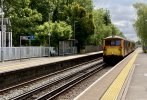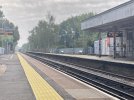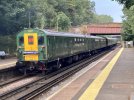You are using an out of date browser. It may not display this or other websites correctly.
You should upgrade or use an alternative browser.
You should upgrade or use an alternative browser.
Prototype Shades of the Southern: Clan Line again
- Thread starter AJC
- Start date
Heather Kay
Western Thunderer
Wow! Those standard coaches in the middle really highlight the narrowness of the Hastings sets!
AJC
Western Thunderer
Wow! Those standard coaches in the middle really highlight the narrowness of the Hastings sets!
Don’t they just! I’ve missed the booked steam that’s been this way, and this is probably more of a niche taste, I’m pleased that I made the effort (and I had a little whistle hello for my trouble, which was nice).
Adam
AJC
Western Thunderer
Shuttling back and forth from my in-laws in Bromley, a reminder of the Southern Region at Bromley South. I suppose the Networkers are strictly NSE, but in real terms with their four and two car formations and lack of through corridors, they’re EPBs in concept (a step backwards from the 455s in some respects: being able to get down the train has value). I reckon this like for likeness was the greatest flaw (not as bad as the Turbos where two or three cars without corridors was a grave error - well, along with not wiring to Reading a generation back). I wonder how much longer they’ll be around?

Adam

Adam
AJC
Western Thunderer
More proper Southern at Tonbridge earlier with a pair of 73s (JBs) on de-icing work as the eldest and I were waiting for the train home.

They rather caught me by surprise, gliding in to platform 1.

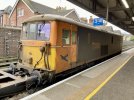
Nice to see that, after all this time, rolling the blinds to red is still the done thing. Proper.

Adam

They rather caught me by surprise, gliding in to platform 1.


Nice to see that, after all this time, rolling the blinds to red is still the done thing. Proper.

Adam
Yorkshire Dave
Western Thunderer
At least they are on home territory!
Curious how the buffers have been clipped on the de-icing trailers. Would this be to allow pipes/hoses to be laid between the vehicles without any danger of being rubbed and/or becoming trapped?
Curious how the buffers have been clipped on the de-icing trailers. Would this be to allow pipes/hoses to be laid between the vehicles without any danger of being rubbed and/or becoming trapped?
Deano747
Western Thunderer
Some heavy weathering has gone on there! Who says you can overdo it?!I did snap the other one, you never know when you’ll get another chance, and I really like 73s, always have.
View attachment 206617
View attachment 206618
And a couple of snatched details of modern de-icing kit:
View attachment 206619
View attachment 206620
Fully through-wired, you’ll note.
Adam

AJC
Western Thunderer
At least they are on home territory!
Curious how the buffers have been clipped on the de-icing trailers. Would this be to allow pipes/hoses to be laid between the vehicles without any danger of being rubbed and/or becoming trapped?
They’re actually made that asymmetrical shape - possibly to guard against over-riding?
Anyway, we’ve been away this week, so a couple from what is, strictly, WR territory, but I only ever saw 33s on Waterloo boat trains down here so it counts.
Weymouth Quay.
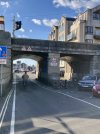
Signage needs an update, perhaps.

Adam
Last edited:
AJC
Western Thunderer
To Wight on holiday. For the first time we went for a ride on the bit of the once extensive island system still left, from Sandown to Pierhead and (most of), the way back. The small people seemed to enjoy it, but struggled to make sense of why so much had been lost. Understandable. The IoW desperately needs a better rapid transit option: the railway is not, alas, it. SWR can only commit to a single unit in service at an hourly interval, currently - this has been the case since February and the printed timetables we saw didn’t mention it.
Even if it were fully operational, the Cowes-Newport-Ryde corridor badly needs something that is not currently there.
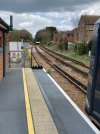
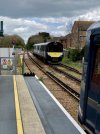
So the pair of units here is illusory: one was on test. In the best (ha!) traditions of IoW railways, they’re second hand, old friends from the District Line. They’ve done a nice job of them but a fleet of five, two-car units in an area with growing population is depressingly unambitious.
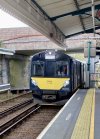
Adam
PS: the four-year-old took us to the bus museum, pleasingly retro - a great big shed full of stuff smelling of moquette, paint, radiators and a hint of oil.
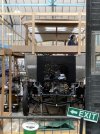
That’s a 1919 Daimler, incidentally. You can add wood shavings to the sensory mix.

Even if it were fully operational, the Cowes-Newport-Ryde corridor badly needs something that is not currently there.


So the pair of units here is illusory: one was on test. In the best (ha!) traditions of IoW railways, they’re second hand, old friends from the District Line. They’ve done a nice job of them but a fleet of five, two-car units in an area with growing population is depressingly unambitious.

Adam
PS: the four-year-old took us to the bus museum, pleasingly retro - a great big shed full of stuff smelling of moquette, paint, radiators and a hint of oil.

That’s a 1919 Daimler, incidentally. You can add wood shavings to the sensory mix.

Last edited:
Yorkshire Dave
Western Thunderer
Well, well, well - The IoW is now no longer the place where you can regularly travel in some of the oldest stock on the BR network. The few remaining HSTs in service on the mainland pre-dates the LT D78 stock by 3 years having been inrtoduced in 1975.
The D78 stock refurbishment makes them look a bit more like US subway stock, especially with the snow plough, and I see they've kept the LT style coupler rather than fit a standard Scharfenberg or Buckeye. Interesting how they carry destination boxes even though it's end to end - unless some terminate at Ryde rather than Ryde Pierhead.
The D78 stock refurbishment makes them look a bit more like US subway stock, especially with the snow plough, and I see they've kept the LT style coupler rather than fit a standard Scharfenberg or Buckeye. Interesting how they carry destination boxes even though it's end to end - unless some terminate at Ryde rather than Ryde Pierhead.
AJC
Western Thunderer
Well, well, well - The IoW is now no longer the place where you can regularly travel in some of the oldest stock on the BR network. The few remaining HSTs in service on the mainland pre-dates the LT D78 stock by 3 years having been inrtoduced in 1975.
The D78 stock refurbishment makes them look a bit more like US subway stock, especially with the snow plough, and I see they've kept the LT style coupler rather than fit a standard Scharfenberg or Buckeye. Interesting how they carry destination boxes even though it's end to end - unless some terminate at Ryde rather than Ryde Pierhead.
Being a self-contained system, I suppose that there's no need to use standard couplers and the LT things work perfectly well. The displays are part of Accessibility Regs (and rightly so). Platform 3 at St John's Road is active so I guess that terminating short is possible - the test train was turning round at Lake for no obvious reason. The stations are all in decent order, and newly repainted with raised platforms to suit the 484/D78s, but the effect is ruined by the failure to keep units available to the required standards - the issue is wheelset wear, apparently.
Adam
oldravendale
Western Thunderer
That's a rather sad rump of the once extensive railway system I remember from the 1960s, and having holidayed on the island for a couple of years recently it'd benefit enormously in the summer from a bigger and better service even though the bus service was quite reasonable. But there's the rub - in the winter it's doubtful that the locals would justify keeping the trains running although with a growing retired population there that need may increase. It was so short sighted to close down so much of the railway and not at least moth ball the routes for possible future reintroduction.
There was another issue, though, as the stations at Ventnor and (I believe) Cowes were at a distance from the towns they served and I guess it's unlikely in todays world that passengers would be prepared for the walk!
Brian
There was another issue, though, as the stations at Ventnor and (I believe) Cowes were at a distance from the towns they served and I guess it's unlikely in todays world that passengers would be prepared for the walk!
Brian
AJC
Western Thunderer
That's a rather sad rump of the once extensive railway system I remember from the 1960s, and having holidayed on the island for a couple of years recently it'd benefit enormously in the summer from a bigger and better service even though the bus service was quite reasonable. But there's the rub - in the winter it's doubtful that the locals would justify keeping the trains running although with a growing retired population there that need may increase. It was so short sighted to close down so much of the railway and not at least moth ball the routes for possible future reintroduction.
There was another issue, though, as the stations at Ventnor and (I believe) Cowes were at a distance from the towns they served and I guess it's unlikely in todays world that passengers would be prepared for the walk!
Brian
I think what's left has rather been overtaken by changing patterns of demand: the need to get people off the end of the pier at Ryde to the beaches on the east coast has been undermined by the size and frequency of car ferries. The resorts themselves are suffering - we had the beach at Sandown to ourselves yesterday and like a lot of seaside towns, decay was very apparent.
Yet the Island's population is growing, it's finally enough to merit two MPs come the next election, but it's growing precisely where there railway was removed, along the north coast. The corridor from Cowes to Newport is over-trafficed and slow - if one were to plan for a rail-based solution (and it's a sound approach), then along the north coast connecting Ryde and Cowes is logical: it's where the people are. Some sort of Light Rail (tram) would seem sensible, but the current proposal is, amazingly, across the empty middle from Sandown to Newport. No idea where you'd put a conventional station anywhere near the middle of Newport, and the new fleet wouldn't be sufficient to serve it, but a tram is plausible.
West Cowes station was more or less opposite the fast ferry terminal - in the town centre - the ferry always (I think) went to East Cowes where the car ferry lands. Vision, both political and planning-wise and resource (and better frequencies - the Devon Metro around Exeter is a model) are an answer: miss a half-hourly service and you may well drive, miss an hourly one and you certainly will. A 20 minute frequency, for at least part of the day is what the buses manage, so why not rail? It doesn't have to be, it's just an option, not for me to say what's right.
Adam
Last edited:
Well, well, well - The IoW is now no longer the place where you can regularly travel in some of the oldest stock on the BR network. The few remaining HSTs in service on the mainland pre-dates the LT D78 stock by 3 years having been inrtoduced in 1975.
The D78 stock refurbishment makes them look a bit more like US subway stock, especially with the snow plough, and I see they've kept the LT style coupler rather than fit a standard Scharfenberg or Buckeye. Interesting how they carry destination boxes even though it's end to end - unless some terminate at Ryde rather than Ryde Pierhead.
Scotrail still have 22 HSTs in service (+ a few not in service).
AJC
Western Thunderer
Inevitably we’ve also been to Havenstreet, which is very ‘Southern’ in its presentation, and a smart example of what a really good small preservation set up can be. Ok, so they have a lot of advantages, but they do a lot right, too.
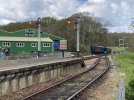
I took this as a reminder that pretty much all our model railways are far too flat. Look at the hump in the siding (the end of which is level, I think), the gradient on the mainline - Haven Street is in a dip - the double slip is on a different gradient to the other bits of the yard. Marvellous.

41313, however, might well be an old family acquaintance from dad’s spotting days around Plymouth - it went almost everywhere, it seems.
Adam

I took this as a reminder that pretty much all our model railways are far too flat. Look at the hump in the siding (the end of which is level, I think), the gradient on the mainline - Haven Street is in a dip - the double slip is on a different gradient to the other bits of the yard. Marvellous.

41313, however, might well be an old family acquaintance from dad’s spotting days around Plymouth - it went almost everywhere, it seems.
Adam
Last edited:
oldravendale
Western Thunderer
I visited about three years ago and couldn't be more impressed. So friendly and beautifully looked after.
Brian
Brian
AJC
Western Thunderer
To London for a work thing today and, owing to the feeble hourly service at Hildenborough (possibly the only station between Orpington and either Hastings or Ashford to be so served), I’ve braved the road into Tonbridge on the bike.
But this did mean a cloud of diesel fug, and a bright light, and that resulted - on the juice by the point it passed me, a neat trick - in 73201, Broadlands. Real Time Trains says it was 0Z18 to Strood and back to Paddock Wood which suggests it was a route learning working.
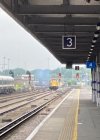

Adam
But this did mean a cloud of diesel fug, and a bright light, and that resulted - on the juice by the point it passed me, a neat trick - in 73201, Broadlands. Real Time Trains says it was 0Z18 to Strood and back to Paddock Wood which suggests it was a route learning working.


Adam

